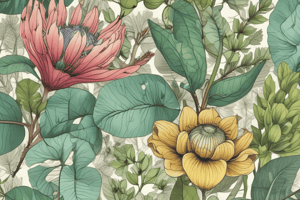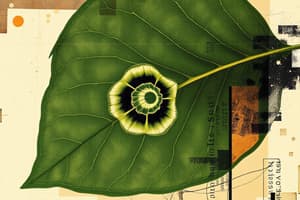Podcast
Questions and Answers
The whole ______ are those usually sold to the public.
The whole ______ are those usually sold to the public.
leaves
The other grades are used for making ______.
The other grades are used for making ______.
galenicals
The drug is packed somewhat loosely, in ______.
The drug is packed somewhat loosely, in ______.
bales
The drug is sent by rail to ______.
The drug is sent by rail to ______.
From Port Sudan, the drug is ______.
From Port Sudan, the drug is ______.
The mesophyll consists of upper and lower ______ layers.
The mesophyll consists of upper and lower ______ layers.
The mesophyll contains cluster crystals about 15-20 m in ______.
The mesophyll contains cluster crystals about 15-20 m in ______.
The midrib is ______.
The midrib is ______.
Below the midrib ______ is a zone of collenchyma.
Below the midrib ______ is a zone of collenchyma.
The median spongy ______ is part of the mesophyll.
The median spongy ______ is part of the mesophyll.
They seldom exceed ______ in length.
They seldom exceed ______ in length.
The color can be described as ______-green.
The color can be described as ______-green.
An alternative color description is ______-green.
An alternative color description is ______-green.
They are more asymmetric at the ______.
They are more asymmetric at the ______.
The edges are rather more broken and curled due to ______.
The edges are rather more broken and curled due to ______.
Digitalis leaves are usually ovate-lanceolate to broadly ______ in shape.
Digitalis leaves are usually ovate-lanceolate to broadly ______ in shape.
Often shows impressions due to the ______ markings.
Often shows impressions due to the ______ markings.
Digitalis leaves are produced commercially in ______ and Eastern Europe.
Digitalis leaves are produced commercially in ______ and Eastern Europe.
Digitalis leaves are about 10-30 cm long and ______ cm wide.
Digitalis leaves are about 10-30 cm long and ______ cm wide.
Chemical tests involve ether extract of hydrolysed acid solution of drug gives with methanolic magnesium acetate solution to create a ______ color in daylight.
Chemical tests involve ether extract of hydrolysed acid solution of drug gives with methanolic magnesium acetate solution to create a ______ color in daylight.
The leaves of Digitalis are ______ and about 10-30 cm long.
The leaves of Digitalis are ______ and about 10-30 cm long.
A chemical test gives an ______ color in daylight.
A chemical test gives an ______ color in daylight.
Digitalis leaves may vary in shape, but they are usually ______-lanceolate.
Digitalis leaves may vary in shape, but they are usually ______-lanceolate.
A ______ in filtered ultraviolet light can also be observed during the test.
A ______ in filtered ultraviolet light can also be observed during the test.
A ______ color is observed in filtered ultraviolet light.
A ______ color is observed in filtered ultraviolet light.
It increases the ______ and improves the tone of the cardiac muscle.
It increases the ______ and improves the tone of the cardiac muscle.
Both reactions resulting in a slower negative ______ but much stronger.
Both reactions resulting in a slower negative ______ but much stronger.
It results in a ______ but much stronger heart beat.
It results in a ______ but much stronger heart beat.
It leads to a much stronger (positive ______) heart beat.
It leads to a much stronger (positive ______) heart beat.
The reactions improve the tone of the ______ muscle.
The reactions improve the tone of the ______ muscle.
Flashcards
Whole senna leaves
Whole senna leaves
The type of senna leaves typically sold to consumers.
Other grades of senna
Other grades of senna
Grades of senna leaves used in the production of medications.
Packing of senna
Packing of senna
The method of preparing senna leaves for transport after processing.
Port Sudan
Port Sudan
Signup and view all the flashcards
Senna transportation
Senna transportation
Signup and view all the flashcards
Mesophyll
Mesophyll
Signup and view all the flashcards
Palisade Mesophyll
Palisade Mesophyll
Signup and view all the flashcards
Spongy Mesophyll
Spongy Mesophyll
Signup and view all the flashcards
Cluster Crystals
Cluster Crystals
Signup and view all the flashcards
Midrib
Midrib
Signup and view all the flashcards
Object Length
Object Length
Signup and view all the flashcards
Object Color
Object Color
Signup and view all the flashcards
Alternate Object Color
Alternate Object Color
Signup and view all the flashcards
Base Shape
Base Shape
Signup and view all the flashcards
Alternate Base Shape
Alternate Base Shape
Signup and view all the flashcards
Positive Chronotrope
Positive Chronotrope
Signup and view all the flashcards
Negative Chronotrope
Negative Chronotrope
Signup and view all the flashcards
Positive Inotrope
Positive Inotrope
Signup and view all the flashcards
Negative Inotrope
Negative Inotrope
Signup and view all the flashcards
Muscle Tone
Muscle Tone
Signup and view all the flashcards
Press Markings
Press Markings
Signup and view all the flashcards
Midvein of Leaflets
Midvein of Leaflets
Signup and view all the flashcards
Chemical Tests
Chemical Tests
Signup and view all the flashcards
Methanolic Magnesium Acetate Test - Daylight
Methanolic Magnesium Acetate Test - Daylight
Signup and view all the flashcards
Methanolic Magnesium Acetate Test - Filtered UV
Methanolic Magnesium Acetate Test - Filtered UV
Signup and view all the flashcards
Digitalis leaf shape
Digitalis leaf shape
Signup and view all the flashcards
Digitalis leaf length
Digitalis leaf length
Signup and view all the flashcards
Digitalis leaf width
Digitalis leaf width
Signup and view all the flashcards
Digitalis leaf attachment
Digitalis leaf attachment
Signup and view all the flashcards
Digitalis production locations
Digitalis production locations
Signup and view all the flashcards
Study Notes
Pharmacognosy - Leaves
- Leaves are lateral outgrowths from stems, typically flattened
- Leaves consist of three main parts: leaf base, blade (lamina), and stalk (petiole)
- Leaf blade's lamina is typically expanded and widest at its broadest portion
- Different types of leaves exist (e.g., petiolate, sessile, stipulate, ex-stipulate) depending on the presence/absence of petiole and stipules.
- Cotyledons (seed leaves) store food reserves (proteins)
- Prophylls are simpler in form and structure than regular green leaves
- Foliage leaves carry out normal leaf functions
- Scale leaves are thin, membranous, and lack chlorophyll, often found on subterranean stems or some aerial stems.
- Bracts are leaves with flowers or groups of flowers in their axils
- Modified leaves can be modified into different structures for specific functions, such as tendrils (e.g., peas), spines (e.g., orange), traps for insects (e.g., sundews), or water storage (e.g., some succulents).
Phyllotaxis
- Phyllotaxis is the arrangement of leaves on a stem
- Alternate (Spiral): leaves are inserted singly at nodes at regular intervals
- Opposite: a pair of leaves is developed at each node, opposite to each other
- Opposite decussate: opposite leaves are inserted at right angles to the pair above and below
- Whorled: three or more leaves occur at a single node
Leaf Base
- Stipules are lateral outgrowths from the leaf base
- Stipulate: leaves with stipules
- Exstipulate: leaves without stipules
Lamina (Leaf Blade)
- Simple leaf: continuous, undivided surface; without lobes or divisions
- Lobed leaf: lamina cut divided into lobes connected by undivided portions
- Pinnately lobed: incisions directed towards the midrib
- Palmately lobed: incisions directed towards the petiole's top
- Compound leaf: lamina divided into separate leaflets.
- Types of compound leaves: Binate (2 leaflets), Ternate (3 leaflets), Pinnate, and Palmate.
Shape of Lamina
- Filiform: thread-like
- Acicular: tube-like (needle-shaped)
- Tubular: tube-like (e.g., onion)
- Linear: flat, edges generally parallel near the midline
- Ovate: egg-shaped, widest portion near the base
- Lanceolate: narrow, gradually tapering to the tip
- Obvate: inverted ovate
Apex of Lamina
- Acute: sharply pointed at the tip
- Acuminate: tapering to a sharp point
- Obtuse: rounded or blunt tip
- Mucronate: abruptly pointed tip
- Recurved: bent or curved backward
- Emarginate: notched at the tip
Margin of Lamina
- Entire: smooth margin
- Crenate: rounded teeth
- Denate: straight teeth, pointed outwards
- Serrate: saw-toothed (teeth pointed towards apex) - Ciliate: fringed with hairs
Base of Lamina
- Symmetric: equal on both sides
- Asymmetric: unequal on both sides
- Decurrent: continuous downwards like wings along the base.
- Cordate : heart-shaped
Venation
- Parallel: Veins run parallel to the margin
- Pinnate: single main vein with smaller veins branching off
- Palmate: several main veins departing from the petiole at the apex
Leaf Surface
- Glabrous: smooth, free from hairs
- Pubescent: hairy
- Punctate: dotted with oil glands
Senna Leaf
- Senna leaflets are the dried leaflets of Cassia senna
- Senna is used as a laxative
- Senna leaves are collected and prepared for use and export.
Belladonna Leaf
- Belladonna consists of the dried leaves of Atropa belladonna
- Belladonna is used for spastic conditions of stomach and intestine
Digitalis Leaf
- Digitalis consists of the dried leaves of Digitalis purpurea
- Digitalis is used in cases of cardiac failure.
Stramonium Leaf
- Stramonium leaf consists of the dried leaves of Datura stramonium and its varieties
- Stramonium leaf is used to control motion sickness
Buchu Leaf
- Buchu is the dried leaves of Agathosma betulina
- Buchu is traditionally used as a urinary antiseptic.
Boldo Leaf
- Boldo is the dried leaves of Peumus boldus Molina
- Boldo is used for gallstones, liver, stomach, and digestive issues.
Jaborandi Leaf
- Jaborandi is the dried leaflets of Pilocarpus microphyllus
- Jaborandi is used ophthalmically in glaucoma treatments.
Henna Leaf
- Henna consists of the dried leaves of Lawsonia inermis
- Henna is used as a hair dye.
Bearberry Leaf
- Bearberry is the dried leaves of Arctostaphylos uva ursi
- Bearberry is used for urinary infections
Green and Black Tea
- Tea consists of the prepared leaves of Thea sinensis
- Used for antioxidant activities and protecting against cancer and tooth decay
Studying That Suits You
Use AI to generate personalized quizzes and flashcards to suit your learning preferences.





